#oppressors
Text
Our generation spent so much time obsessing over the hunger games and if you were a big fan you probably thought a lot about how you’d be and romanticised being a katniss type and overruling your evil oppressors …. and then when ACTUAL horrific injustices happen in the world you’re silent. You’re ‘on the fence’ or seeing it ‘from both sides’ or you’re ‘not informed enough to have an opinion’ or the worst of all you’re PRO oppressors and Pro colonisers ??????? But you’ve got tickets to go see ballad of songs and snakes and you came out the movie theatre feeling all riled up to be a badass and take on a corrupt government just to support Israel and buy Starbucks …. Huh ??? Make it make sense. You’re either Pro Palestine or you’re okay with genocide.
FREE FREE Palestine 🇵🇸
#free palestine#pro palestine#gaza#share#palestine#world#israel#film#hunger games#hgbosas#the ballad of songbirds and snakes#tbosas#hunger games fandom#oppressors#free oppressed people#from the river to the sea palestine will be free#katniss Everdeen#mockingjay#current events
257 notes
·
View notes
Text
There is no marriage equality until disabled people like myself can get married without losing benefits to survive
3K notes
·
View notes
Text
#free palestine#Palestine#Israel#conflict#war#genocide#oppression#ethnic cleansing#free Gaza#gaza strip#gaza#Jewish#Muslim#holy war#holy land#oppressors#oppressed#reality#current events#world news#politics#israeli government#apartheid#palestinian people#Palestinians#Israelis#middle east#end israeli apartheid#west bank#segregation
214 notes
·
View notes
Text



I'm a history buff and this last line is what one of my favorite professors says all the time. I REALLY love this clip.
#marvel#ms marvel#marvel ms marvel#history#oppressors#iman vellani#kamala khan#g willow wilson#nakia bahadir#yasmeen fletcher#post colonialism#colonizers
3K notes
·
View notes
Text
oppressors
dwell
in
darkness
darkness
in
oppressors
—Ahmed Salman
17 notes
·
View notes
Text
Something I’ve learned in the last 20 something years of being Afghan. People who are with you, will show you, they’ll show up . Marginalized groups will forever show up for one another. My Palestinian Brothers and Sisters showed up for my Black Brothers and Sisters, and visa versa, and Afghans are going hard for our Palestinian fam. Iraqis, Yemenis, Syrians, Iranians, Venezuelans, Cubans, those from Artsakh, and everyone else affected by colonialism are all standing with one another in solidarity. There is a telepathy between our hearts. Just as we’d go hard for those being oppressed in Nazi Germany, during Jim Crow, etc., we’re not just in this with words. The oppressed stand with the oppressed, period. It’s a shared struggle. There’s only one group of people that I’ve been around, whether it was friends, colleagues or folks I’ve dated- that have had excuses. “I don’t know how to show up,” “I wanted to but didn’t because (insert excuse here),” “I didn’t know how to learn about x, y, z” etc. Those who are so far removed that they’re silent, choose to ignore the rest of the world and what they’re going through, and it never ceases to amaze me. There is literally a genocide going on in live time, but because they don’t look like you, they don’t speak the same language as you, because of the deep rooted racism you never dealt with, you chose to turn a blind eye and not say/do anything.
The one thing I know, is the person I end up with is gonna stand up against injustices alongside me and say it with their chest. If you choose indifference you’re just as bad as the oppressor. May the ghosts of those whose suffering you turned a blind eye to haunt you.
#Palestine#Afghanistan#Middle East#War#Oppressed#BLM#Oppression#Solidarity#hit#trauma#protest#resist#conflict#oppressors#racism#Islamophobia#xenophobia#struggle#Gaza#West Bank#Syria#Yemen#Lebanon#fight#History#Occupation#War Crimes#Injustice#Justice#Colonizer
11 notes
·
View notes
Text
16 notes
·
View notes
Link
Moreover, in direct conflict with the Jews’ belief that they can only forgive those who have personally harmed them and only the Almighty can dispense forgiveness to everyone else, social justice warriors arrogantly assume a god-like ability to forgive—or to be more precise, withhold forgiveness from—Western society on the basis of its perceived level of self-flagellation.
This narcissistic hubris derives from the secular belief that the individual is the center of the universe. It has encouraged people to define their own reality according to whatever fantasies they may entertain about creating a better world.
Such a substitution of objective reality by subjective feelings has led to the acceptance of lies as truth and vice versa. This is a major reason why anti-Zionism has achieved such traction in liberal circles over the past few decades.
The reversal of truth and lies, justice and injustice, victim and oppressor is intrinsic to intersectionality, the “social justice” doctrine that views alleged systems of discrimination or disadvantage such as race, class and gender as overlapping and interdependent. This is because “social justice” is based on the belief that all relationships are structures of power, whether political, military or economic.
With Israel and the Jewish people seen as powerful and therefore oppressive, intersectionality has put rocket fuel behind anti-Zionism and anti-Semitism in progressive circles.
This fundamental connection between “social justice” and anti-Jewish attitudes is denied by those circles—for whom any dissent is seen as proof positive of being “right-wing” and therefore evil. This is why their attempts to tackle anti-Jewish bigotry are doomed to failure.
35 notes
·
View notes
Text
But there are none so frightened, or so strange in their fear, as conquerors. They conjure phantoms endlessly, terrified that their victims will someday do back what was done to them--even if, in truth, their victims couldn't care less about such pettiness and have moved on. Conquerors live in dread of the day when they are shown to be, not superior, but simply lucky.
The Stone Sky by N. K. Jemisin
6 notes
·
View notes
Text
youtube
youtube
youtube
youtube
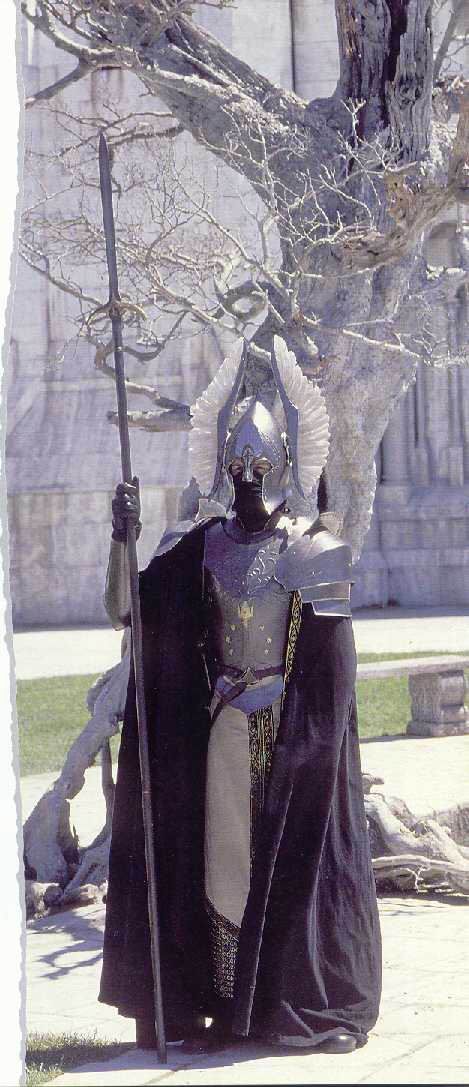


youtube
youtube
youtube
Merry XMas,
Salvation
youtube
🎁
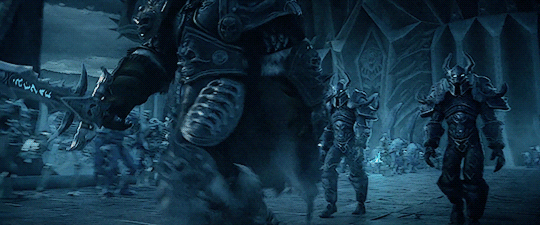
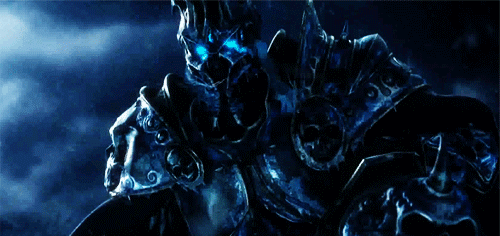

youtube

youtube
Pa rum pum,
Gabye
https://www.reddit.com/r/wow/comments/15hgc2g/art_done_by_me_void_elf_shadow_priest/

Varena
The Beacon
🚨
High Priest of Eternity.
∆
Order.
-
To go ridin' on a white horse sleigh.
The mystery of Gahd.
Littl Saint nick.
Run run reindeer.
G
#Song of the Century#Gnosis#Crow#Merry xmas#Eternity#Statement#Thelema#Will of God#HEAVEN#Circle Squared#God Freed#Hallelujah#!#!!! <3#<3#Creepy#Abusers#Unlawful#Oppressors#End Your Revellion#The Wrath of god#Frosty#Frostie#Truth#Baby#yeshua#Is not a name#Idolators#Symbol#Symbolism
2 notes
·
View notes
Text
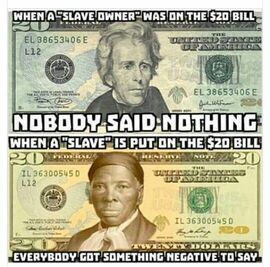
Nope! That’s how this nation is. Filled to the brim with HYPOCRISY and DOUBLE STANDARDS! From DAY ONE in “school”, we are taught to WORSHIP men who more than likely OWNED our ANCESTORS. Then we are told not to use COMMON SENSE and believe what our eyes tell us. “The Founding Fathers hated slavery!” Coulda fooled me! “If slavery was abolished immediately it would fracture the already fragile union”. In other words: Keep southerners happy plus the Negro has never had it so good!” In the next breath complain about King George’s tyranny! This shows you exactly which lives MATTER and which DO NOT! An OWNER of HUMAN BEINGS is regarded as a HERO and ROLE MODEL! Not mine! Malcolm, MLK, Garvey, Nat Turner, John Brown, Farrakhan, Khalid Muhammad, Chuck D, Black Panther Party, Young Lords, Che, Muhammad Ali, and a few others are MY HEROES! Not ONE ever owned a PERSON!
#whiteracism#oppressors#slavemasters#CRT#blacklivesmatter#whitelies#realamericanhistory#whitehypocrisy#blackgenocide#blackunity#blackpower#whitesupremacy#blackpride#history#politics#culture#blm
17 notes
·
View notes
Link
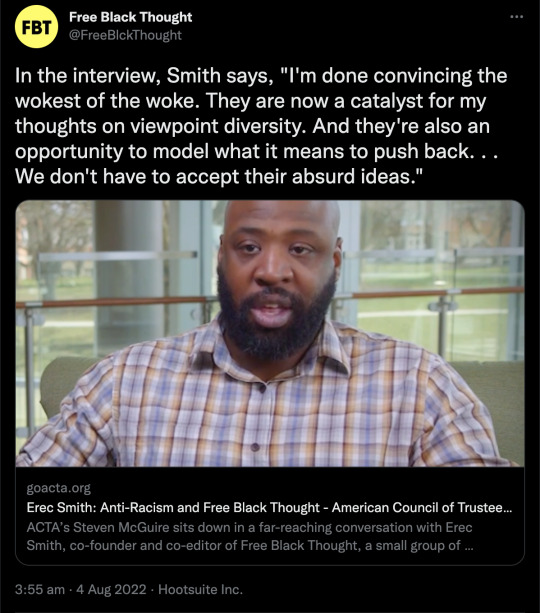
Podcast Published: Aug 2, 2022
[..]
Steve McGuire: Anyways, maybe we start by just setting up what was the keynote about? What was your critique of it?
Erec Smith: Well, the keynote was at a conference called the Conference for College Composition and Communication. The keynote address, I'm forgetting the very long title, but it was, How Do We Use Language to Stop People from Shooting Us or something like that. And his overall argument was that white professors, white scholars are inherently problematic. He used terms like students of color feel suffocated by whiteness. And this idea that language is sold as something that will save our lives, but it won't. I don't know anybody who thought that language would make one bulletproof so I didn't really understand that either. I thought this did a little bit more harm than good. It didn't just demonize white people. It infantilized people of color. Scholars and students. So I went to the listserv and I asked, "Was this the best way to go about this? I think this was pretty problematic and we should talk about it."
That was not met with agreement. It was not met with a desire to talk. It was met with a desire to yell at me and not listen to my responses. That's for sure. And I realized something then. I realized that there is a particular narrative that is heavily founded on victimhood, infantilization, the oppressor/oppressed dichotomy. And that if you don't abide by it, then you are a bit of a pariah. There are sacred texts. I mean, John McWhorter's characterization of this as a religion is apt. There are texts you cannot question. There are people you cannot question. There is a party line you cannot steer from. And that's that. It is somewhat cultish. I like to tell my students emotional intelligence is it about not ever getting angry, it's about channeling anger into something more productive.
So that's what I did. The initial anger, which eventually became just amusement, but we can talk about that a little bit later on. The initial anger resulted in two books, several articles about the misguided nature of contemporary anti-racism. And a website and online journal called Free Black Thought. I have other things in the works right now, but those are the solid things. And it's changed my career. I had no intention of doing this stuff before that listserv, before that thread. No intention. And here I am, and I'm speaking all over the country about these things. I'm being asked to moderate very popular panels. And this is all because I'm pushing back against the contemporary mode of anti-racism in academia.
Steve McGuire: Right. Right. So you're not yourself just against anti-racism in toto, you just have a critique of certain contemporary trends within anti-racist discourse and action, I guess.
Erec Smith: Right. Right. And a lot of people will mischaracterize me as being against fighting racism, which makes no sense whatsoever. And the people who say that, I mean, this is why nuance is kryptonite tonight to woke ideology. It's got to be either or, or else their ideas fall apart. So to critique this version of anti- racism comes off as I'm against fighting racism. Right?
It can't possibly be, I don't like this particular strategy. I want to do this strategy. No, that's not possible at all. So my critique of anti-racism is the fodder for my last two books. One called A Critique of Anti- racism in Rhetoric and Composition, and one called The Lure of Disempowerment. The first describes the contention and issues around anti-racism in academia. The second is more prescriptive in that it is trying to provide a possible alternative to a lot of DEI trainings, which again are based on a oppressor/oppressed dichotomy and a lot of guilt and victimhood. So, yeah.
[..]
Steve McGuire: Interesting. Yeah. In the first of the two books that you mentioned, you propose an alternative approach to anti-racism that's based in empowerment theory. Could you maybe just describe how that is different from the current trends in anti-racism that you're critical of and what that is and why you think that could be a more productive approach?
Erec Smith: Well, I think current anti-racism, based in what I call, what others also call critical social justice, it necessitates victimhood, it necessitates infantilization, it necessitates disempowerment. The people in question have to be distinctly disempowered first and foremost. If they're not, then nothing else works. So you're already casting people in victim and oppressor roles before you even know them.
And that's wrong for obvious reasons, but it's also wildly disempowering. And so how do we do this in a way that doesn't infantilize some and demonize others, but empowers everyone? Because I do think that feeling empowered goes a long way in being able to accept other people. Because a lot of what's going on is that we project our insecurities onto other people. We project our fears on other people without even realizing we're doing that. So empowerment theory, what that does is help us be more self aware. It promotes metacognition, emotional self control, things like that. So that we can meet people where they are. And once we meet people where they are, we can have generative conversations about what needs to happen in ways that doesn't guilt people or patronize people or anything like that. And that's why I embrace empowerment theory. I dedicated a para ... I'm sorry, paragraph. A chapter to it in my book, A Critique of Anti-racism. And that chapter was expanded into an entire book called The Lure of Disempowerment. And so that's really what I'm driving these days.
Steve McGuire: Okay. Yeah. In the first book, The Critique of Anti-racism, in the introduction, you point to W.E.B. Du Bois as an example. And I was reading that and I was like, yeah, this is ... I mean, it's a really inspirational story. I wonder, is Du Bois ... He's an exceptional person. He's an exceptional intellect. He demonstrated exceptional courage. He clearly had a degree of self confidence. Is that the kind of thing that you're hoping for everybody to achieve? I can see somebody saying, needing to be like that just to get through the academy or something like that is a lot to ask somebody, if that makes sense.
Erec Smith: Well, you're not being like that to get through the academy. You're being like that to be like that.
Steve McGuire: Okay.
Erec Smith: And that's empowerment. The ability to not let somebody discourage you because of what their thoughts are about you. It doesn't matter. I often tell people, "Listen, if somebody calls me the N word in traffic, I don't care. I'm going to my tenured professorship to shape young minds and then research and write scholarship on topics I care about. And this guy is going to a bar at 8:00 AM. I win. I don't care about that guy's opinion." But I know that is a very unpopular disposition. So with empowerment theory, what I'm doing is saying you can create a disposition that can't be toppled.
You can do that. You can realize that somebody disagreeing with you isn't epistemic violence. You're not harmed. They just disagree with you. You can move on as long as people aren't in your way and blocking you. And if they are in your way and blocking you, then empowerment theory can help you better deal with that situation more strategically, more productively. In ways that don't indicate that your emotions are overpowering your ability to look at a situation for what it is. And I mean, that's what I see when I point to Du Bois and his attitude. I mean, he had that attitude in the 1880s. A black person in Harvard in the 1880s. If he could have that attitude then, then we cannot embrace victimhood now. Frederick Douglas had a similar disposition. When abolitionists would ask, "What should we do about black people?"
The black question. He said, "Don't do anything. Let them fall. That's how you learn how to get up." He was all about, "Just let us do this. We're adults. If you leave us alone, we'll handle it." And they didn't like that. They actually didn't like that. They liked the idea of minorities being the poster people for victimhood. I guess it helped them with their political aspirations as well. But Zora Neale Hurston's another one. She spoke out about this. She lamented the fact that the only role for black people was one of pity. And people were uncomfortable by the confident and successful black person. They didn't know what to do with that. They knew what to do with the downtrodden black person who needs white people to save them. And they knew what to do with that. And Zora Neale Hurston complained about it. In fact, she died in abject poverty because she had this position. And fought a lot, interestingly enough, with W.E.B. Du Bois. But that's fodder for a different conversation. But yeah. I point out Du Bois. I think he's a great model for dealing with things. He's a great model for what it looks like to be empowered. And I'm glad I put him in the book.
[..]
Steve McGuire: Yeah. Viewpoint diversity or intellectual diversity, a lot of people think that's a problem, say, in higher ed in general. I mean, you've got Heterodox Academy. And I think that probably a lot of people in various ways have found themselves in situations where they didn't think the way that people expected that they would think based on what they knew about them. Like I myself lean conservative, but I have a PhD, I've taught in the university. A lot of studies show there aren't that many conservatives in higher education. And so in terms of talking about politics, often I'll find myself in a minority viewpoint position. But I guess the question I'd like to ask you is how is it different or amplified when race is involved? And I could imagine it's a much bigger problem. Maybe one that is experienced on a more pervasive basis. I don't know. I'm just interested to know what your thoughts on that would be.
Erec Smith: Everybody thinks I'm a conservative because of these views. I wouldn't call myself that. I would say I'm left of center. I would say I'm somebody who embraces classical liberalism, which used to be something that both sides of the aisle could get around. I mean, it's the Venn diagram of Republican and Democrat, the center, what's classical liberalism. At least there was that. But that doesn't seem to be the case anymore. So people of all colors just assume I identify as a black conservative and I don't. That being said, at the college level ... And York College of Pennsylvania, where I teach, is not egregiously woke in any way. There are people here and there, but it's not a place that I feel uncomfortable walking onto. So there's that. But the field, the field of rhetoric and composition is a different story altogether. And yes ... Excuse me. I've been called a white supremacist by white people in the field. So that's how bad things are.
[..]
Steve McGuire: Interesting. You mentioned a few minutes ago that this has been something that you've dealt with your entire life, and I was just wondering if you'd say a little bit more about that. Is it that you've always had heterodox social and political views or interests, or what is it that put you in a position where you've had to contend with this so regularly?
Erec Smith: Well, I was always not being black correctly.
Steve McGuire: Okay.
Erec Smith: And I got this from white people as well as black people. So I've been dealing with this since I was a kid growing up in a predominantly white neighborhood and being reminded of that on a regular basis, several times a day. And then going to a more diverse high school and being shamed by the black students for being too white.
Steve McGuire: I see. Okay.
Erec Smith: So the combination of that, I didn't know it at the time, but that really set me on a path to where I am today, really, because I was very interested in why two people can come to the same conclusion for very different reasons, through very different values, attitudes and beliefs, very different ways of describing the world of using rhetoric on themselves and others who describe the world they see fit. A world in which I have to play a particular role. And that role can't be the smartest guy in the room, or that role can't be one of respect and virtue. It can't be one of optimism. An attitude of success. Wanting to follow your dreams and things like that. It was like both parties were saying, "How dare you like yourself? Don't you know you're black?"
They were both saying the same thing there. But they took different paths toward it. And that is something that can be addressed in rhetorical theory. How are we describing, what words are we using to describe this world? And how can we come to the same conclusion from apparently different places? Because we have similar ideas about ethos, about who we are in a grand meta narrative of society. And although we seem like we are fighting each other, we kind of abide by that narrative. We're all abiding by that narrative. So I was very interested in that. I didn't know the word rhetoric at the time. I didn't know the word discourse at the time. Ethos and things like that. But I would eventually discover it and realize this is where I belong.
Steve McGuire: Okay. So you're talking like, yeah, audiences have expectations of you right off the bat, just looking at you or hearing you speak or what they think they know about you and that sort of thing.
Erec Smith: Right.
[..]
Steve McGuire: It's like you were saying earlier, everything's binary. It's either-or. I'm wondering, what do you think is ultimately the source of that? It seems like it's just so crucially important that you agree, going back to this listserv debate, that students be taught or be allowed to express themselves in, say written assignments, I guess, through the African American vernacular English, as opposed to standard English. And the suggestion that it would be valuable to learn standard English is just instantly seen as anathema. You can't even debate that point because it would already be conceding too much even to consider it.
Erec Smith: Right. Yeah. They don't want to dignify it with a response.
Steve McGuire: Yeah. Right.
Erec Smith: Right. And the whole idea that expecting students of color to learn standardized English is inherently racist. That was also a part of the keynote address that sparked all this.
Steve McGuire: Okay. Yeah.
Erec Smith: So yes. That's part of it. Any kind of pushback will expose them for the flimsy ideas that they have. So they can't allow any kind of pushback. And so that's why you get the treatment that I got from the listserv. But there's something else going on as well. And this something else derives from what's called critical pedagogy, which derives from critical theory, which is something that derives from a Marxist think tank called the Frankfurt School. And there is a very clear thread between that school and what's going on today. When I talk about it, I sound like a conspiracy theorist, but it's true. It's all there. And what's there is the idea that the point is to transform society. Society is bad. That's not an argument. Society's already bad. When it comes to cultural Marxism or race Marxism, society is racist. This situation is already racist. That's already decided. These students are downtrodden and they feel bad and they're victims and we need to liberate them. That's already decided. There's no conversation about that. If you want to have a conversation about that, you're a bad person who doesn't get it or you're suffering from false consciousness.
Steve McGuire: Right. Yeah. Right.
Erec Smith: And those students who want to learn standard English, but they're black, that's false consciousness.
Steve McGuire: Right, right. Right. So you're not offering a counterargument that deserves to be considered, you've just made an error that needs to be pointed out to you.
Erec Smith: Right.
Steve McGuire: Yeah.
Erec Smith: Right.
Steve McGuire: But it seems like at the end of the day then, it's motivated by something other than scholarly concern to know what's true. It's motivated by politics or you reference McWhorter and his idea that it's a religion, which would make it a kind of spiritual problem or theological problem, not just a political one. But that raises the existential stakes for people who adopt these views to such a level that it literally is harmful or even heretical to hear or consider other points of view. Does that seem fair to you to say?
Erec Smith: Well, yes. Because, as is true for many critical theorists and pedagogues, the point is to change society. The point is to transform it. And this comes straight from ... Marx said, "Philosophers have been describing the world, but the point is to change it." I mean, that sentiment is still alive and well and in various corners of academia. So when that's the main goal, what education becomes is a trojan horse for those ideas. So you have the equitable math whitepaper. Maybe I shouldn't say whitepaper. Recommendation report that basically turns a math class into social studies. You have questionable accounts of history that are formatted that way to support this narrative that supports the need to transform society. And Lenin gave this advice in the 1920s. He said, "It's not enough to just learn these ideas. You have to learn math in so far as it supports communism." History in so far as it supports communism. And that's going on right now. There's a leader in my field who thinks that black students who want to write in standard English are immature and selfish. Because their success in acquiring standard English will help them go out and probably be better equipped for certain jobs and be happy and successful and therefore maintain the status quo.
Steve McGuire: Right.
Erec Smith: Right. Happy and successful people don't revolt.
Steve McGuire: Yeah. It's very similar to Marx. Yeah. You don't want people to be just materially satisfied enough that they're not going to go out into the streets. Interesting. You've said your career pivoted since 2019. You're tackling this stuff head on now. So you must at least have some small hope that pushing back and arguing against these ideas could have some positive impact in the academy. At the same time, it seems like this is the pretty strong wave or series of waves that's washing over a lot of places in higher education in the United States. And a lot of people don't have, I think, much hope at least for the immediate future that we can really successfully push back on some of these ideas. What are your thoughts on that?
Erec Smith: Well, I'm done convincing the wokest of the woke. Or trying to anyway. They are now a catalyst for my thoughts on viewpoint diversity. And they're also an opportunity to model what it means to push back on these people and why, and that we don't have to accept their absurd ideas. There are people out there who are listening to these things and saying to themselves, "I must be missing something. This makes no sense, but it's my positionality that keeps me from understanding what's going on." No, no. You're seeing it correctly. It's absurd. It makes no sense. You're seeing it correctly. And I want to confirm that. I don't just want to confirm it. I want to confirm it and meticulously explain why it's the truth. I just want to be that voice out there. I want people to know that not everybody's buying this crap. So long story short, I'm done trying to convince people. I am trying to "save" people who haven't fallen into the woke abyss yet or are still trying to figure out what's going on. That's what I'm trying to do. And I want them to know that there are people out there like them, like me, who they can reach out to.
Steve McGuire: Right. Yeah. Yeah. And you seem to have a bit of ... You mentioned earlier at the beginning, something about that you were angry, I think, earlier when you went through what you went through in 2019, but now you seem to be able to laugh about it, joke about it. It at least appears to me like you have no compunction about just calling it like you see it and saying it flat out with no apology. Is that the case and how did you get there?
Erec Smith: Yes. That is the case. And I got there from ... I mean, initially, the pushback, I was like, "Wow. They must not really understand what I'm trying to say. If they'd only listen to me." When I realized that they're just living in this world that makes no sense whatsoever, then they became jokes to me. And that's what they remain. So when people try to call me out and mob me again like that, I get excited. I'm like, "Okay. Yay. All right, we're doing it again. All right. What idiocy are going to say now? What absurd ideas are they going to throw at me now?" So I take that attitude about it now, and it makes all the difference. It really does. If you can point out their absurdities and do it in a way that is amusing and memorable, then you can probably get a little bit farther with these ideas instead of always being serious or stern all the time. I mean, that's important too. But I mean, when somebody says something ridiculous, point out the ridiculousness. Yeah.
[ Full podcast transcript ]
#Erec Smith#Free Black Thought#W.E.B. Du Bois#Zora Neale Hurston#antiracism#antiracism as religion#critical theory#critical pedagogy#false consciousness#cultural marxism#liberalism#liberal ethics#wokeness as religion#woke activism#cult of woke#wokeism#woke#oppressors#victimhood#victimhood culture#empowerment#infantilization#neoracism#long post#religion is a mental illness
10 notes
·
View notes
Text
#media#media bias#media coverage#palestine#israel#free palestine#israeli government#Gaza#gaza strip#free gaza#West Bank#occupied palestine#occupied west bank#oppression#oppressed#oppressors#Jewish#Muslim#holy land#holy war#religion#religious#current events#world news#politics#politicians#journalism#journalist#reporters#trust
7 notes
·
View notes
Text
i quite genuinely hate 95 percent of ffxiv fans. especially white ones. zenos and emet selch apologists go to hell when they die btw
#battle litany#the game will be like these two are vile human beings. one founded an empire that oppressed and colonized others for years and the other is#his grandson who helps maintain that empire and people argue he doesnt care about politics#but apathy IS political and hes also a heinous piece of shit fascist but oh well.#same fans who called poc sociopaths for not showing sympathy to garleans like why are we expected to when they perfectly mirror our irl-#oppressors#sorry im kind of very pissed off
10 notes
·
View notes
Video
youtube
Here’s a clip from one of my favorite debates, Noam Chomsky vs. Michel Foucault. Please watch before reading what I have to say, because I’m quite biased when it comes to these two. Essentially I think Foucault’s ideas on power were, at their core, Marxist. From the opinions he expresses in the debate, he believed all individuals were fundamentally oppressed by the institutions of society, and it didn’t matter which institution, because all of them were tainted in a sense by the ruling elite either directly or through a social attitude propagated by elite factions, such as the intelligentsia (paralleling the Marxist bourgeoisie). Chomsky’s reply is that an ideal society is one in which the facilitation of free expression is the highest goal. They tend to talk past each other since, as Foucault believes that human nature itself is a lie spread to enforce the power dynamics of society. What it boils down to is an argument of bold optimism, to understand and trust the human faculties and strive toward a better society based on those faculties vs. hyper-rational pessimism, to reject all aspects of society, even your own idealizations of a good society, and either A) hide in a corner, or B) revolt.
“It’s of critical importance that we have some direction, that we know what impossible goals we’re trying to achieve if we hope to achieve some of the possible goals, and that means that we have to be bold enough to speculate and create social theories on the basis of partial knowledge while remaining very open to the strong possibility, in fact, overwhelming probability that we’re very far off the mark.” Noam Chomsky.
“The concept of human nature, the notion of goodness, justice, of human essence and its realization, are all notions and concepts that have been formed within our civilization, in our type of knowledge, in our form of philosophy, and as a result, they are part of the class system.” Michel Foucault.
#philosophy#noam chomsky#michel foucault#chomsky#foucault#communism#marxism#marx#democracy#france#power#society#oppressors#debate#cold war#socialism#socialist#mao#karl marx#justice#vietnam war
7 notes
·
View notes
